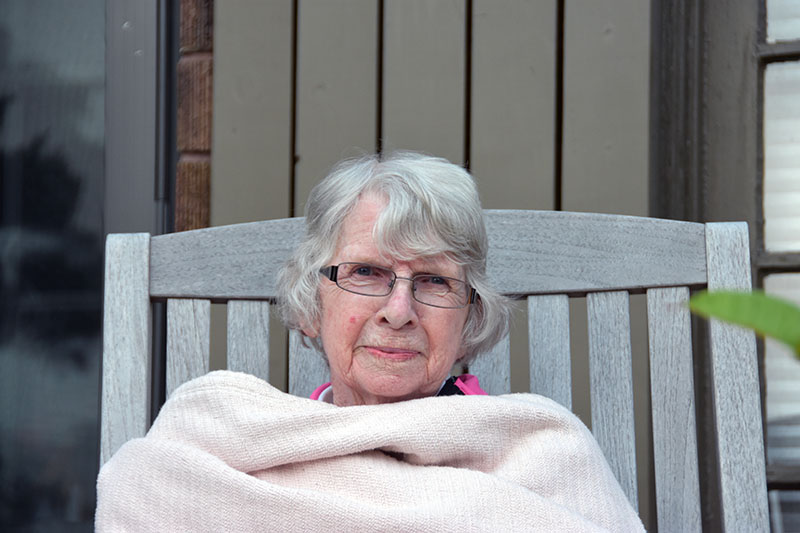There are tipping points. Up until the tipping point, the resistance you have as a witness to this disease is amazing. My mom's executive function is pretty much shot; she's an unreliable narrator. That means, among other things, that boundaries that were firm and seemingly permanent, evaporate. Issues of privacy and respect have to be addressed. I am stepping into her space, but I do so by asking permission each step of the way.
I don't know if you've ever heard the bit by Larry David where he tells of attending some party when he was writing for SNL. David is a comic's comic. They were at the bar watching all these idiot men they knew coming in with beautiful women and bemoaning their single state. David finally yells out, "My name is O'Banyon; I need a companion!" I was listening to that with my mom and it broke us up. I said to her, that line would win me over, but I'd yell back, "My name is O'Toole and I think you're a fool!" Anyway, back to the privacy and permission...when I need to get in and help her in ways I haven't had to before, I now say, "I'm O'Banyon, your companion." It makes her laugh.
On Forgetting
12.16.15
The noticeable forgetting -- the undeniable moment when it is recognized that this is actually happening -- is such an unsettling point, not for the person doing the forgetting, but for their loved ones. The resistance to that fundamental change is fierce.
That moment came for me over the phone. My parents had been living in Florida and I was in Chicago. I talked to my mom daily. I was writing a novel and she was always waiting for the next chapter. I made some comment about narrative details in the chapter I had read to her the day before. She said she couldn't wait to hear it. I told her I had already read it to her. I reread it; it was all new to her. That was my moment, the moment I knew something was wrong, and it left me gripped with fear.
By the time my dad had been diagnosed with stage IV lung cancer she'd ask every day what was wrong with him. She thought he had a bad chest cold. I had to retell her each time that he had cancer. She'd say, "I didn't know that."
12.15.15
There are, generally speaking, 3 stages of Alzheimer's:
<http://www.alz.org/alzheimers_disease_stages_of_alzheimers.asp>
My mom is in the late middle stage. We're living longer. More of us will be experiencing this with our loved ones. Here are some facts from a 2012 report:
•One in eight people age 65 and older (13 percent) has Alzheimer’s disease.
•Nearly half of people age 85 and older (45 percent) have Alzheimer’s disease.
•Of those with Alzheimer’s disease, an estimated 4 percent are under age 65, 6 percent are 65 to 74, 44 percent are 75 to 84, and 46 percent are 85 or older.
<http://www.alz.org/downloads/facts_figures_2012.pdf>
12.11.15
I keep things simple. My mantra: Eat when you're hungry; sleep when you're tired; let's take a walk. Every day she has vanilla ice-cream; a piece of dark chocolate; a glass of red wine.
My mom liked David Letterman. For the last six months his show was on, she rarely made it to 10:30 p.m., when he aired in Chicago. One night she told me that she had forgotten how to get to David Letterman's. She said she used to go there all the time and now she didn't remember how to get to the street where he lived.
I told her she could find him with the remote control, from the comfort of her bed. I would help her.
She was relieved.
We laugh a lot. She knows she has a problem. When she's fully aware, which is often enough, she can't believe the stories I tell her about things she's said and done. It's like there are two people: the Maggie that was always there, and the one that's slipping away.
On Forgetting
"Generally speaking, I’d say I’m a fan of forgetting; it’s liberating, and usually errs on the side of happiness, while memory is a burden. It’s an ally of remorse, resentment, nostalgia, and other sad emotions." ~ César Aira
_________________________
My mom is 86 and has Alzheimer's. It was clear to me at the time of my dad's death, six years ago, that she couldn't live on her own. I brought her back to Chicago with me; she was born here, not far from the apartment where we live right now.
I'm not sure that I agree with Aira's statement, but forgetting, nonetheless, is what we do. I have a front row seat at an accelerated version of it. Some of what I see may help someone else; it may help me.
